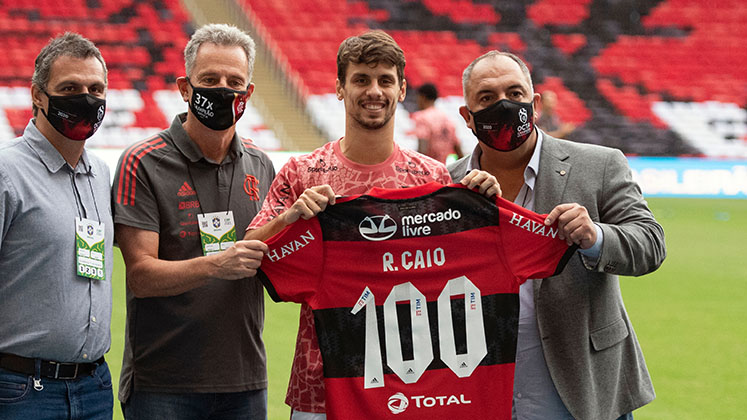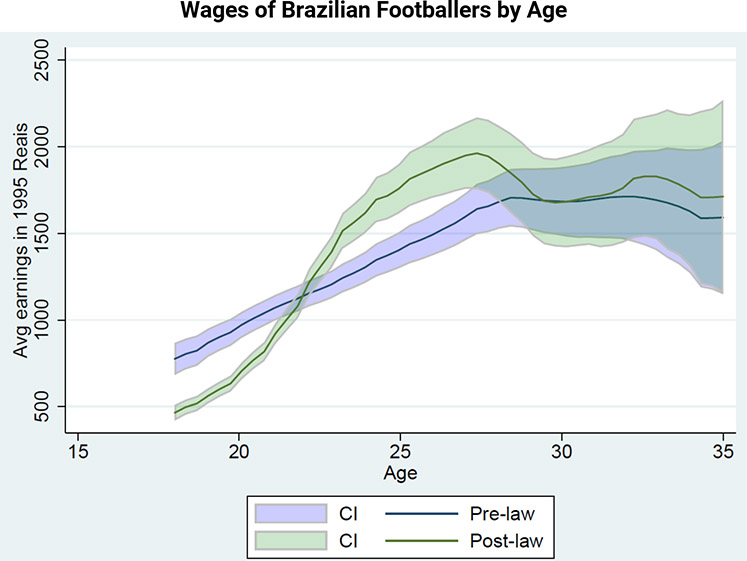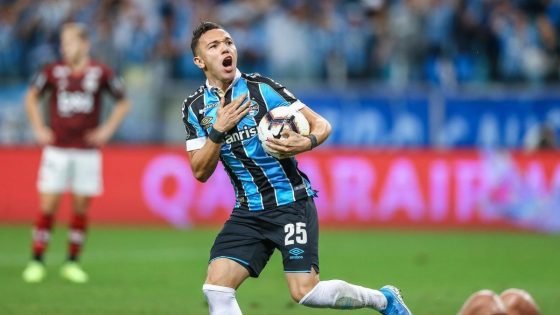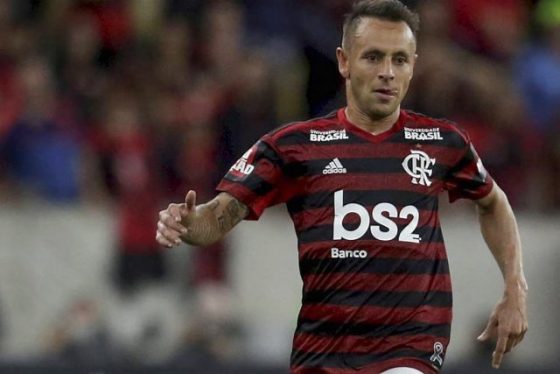The beautiful gain: what can Brazilian football tell us about the effect of non-compete clauses on wages?
With the 1998 Pelé Law eliminating transfer fees for players whose contracts had expired, Brazilian football provides an ideal setting to test the effect of non-compete agreements on wages. This analysis reveals that older players gained the most, whereas the wages of young players fell, which has wider implications for policies on the use of non-competes amongst low- and high-income employees, write Bernardo Guimarães, João Paulo Pessoa, and Vladimir Ponczek (all Sao Paulo School of Economics-FGV).
Non-compete agreements, which temporarily prevent employees from entering into competition with their current employer once they leave, make it impossible – or at least very costly – for many employees to accept job offers in similar fields, firms, or markets. It has been estimated that 18% of all US workers are currently bound by non-compete agreements. This figure rises to 39% for those with a professional degree and to 46% for those earning over USD 150 thousand a year.

This sheer prevalence has recently seen non-compete agreements become an important policy issue. Towards the end of 2020, for instance, the UK government launched a public consultation about a possible ban on non-compete clauses.
The effects of non-compete clauses are theoretically mixed. On the one hand, they might be beneficial for strategic reasons, such as protecting trade secrets. On the other, they might adversely affect wages. Moreover, by imposing costs on labour mobility, non-compete agreements could hinder the efficient matching-up of employers and employees. But how important are these effects? Surprisingly, football might well provide an answer.
How do non-compete causes relate to Brazilian and world football?
Generally, the labour market for footballers involves transfer fees. In August 2020, for example, Lionel Messi made public his intention to leave FC Barcelona. But since his contract was due to expire in 2021, a rival club would have had to pay a £630 million fine to sign Messi. Since no club was willing to pay such an astronomical sum, Messi decided to stay one more year and (potentially) leave Barcelona for nothing at the end of his contract.
Though now a common feature in the market for professional footballers, moving freely at the end of a contract was not always an option. Until 1995, clubs in the European Union could demand transfer fees even after the contract had expired. It was only when the Belgian midfielder Jean-Marc Bosman successfully challenged the legality of this state of affairs via the European Court of Justice that football changed forever.

In Brazil, meanwhile, legal arrangements between players and clubs remained as they had been in Europe prior to the Bosman Ruling. This changed in 1998 with the Pelé Law, named for the great Brazilian player and then Minister of Sports who had been a leading light of the campaign for a ban on non-competes. After the new law came into force, teams could still include clauses demanding transfer fees for players, but only during the term of their contracts.
How do non-compete agreements affect labour markets?
In a recent discussion paper, we explore this policy change in Brazil to study how non-compete agreements affect wages and efficiency in the labour market. Brazilian football constitutes a particularly appropriate context for studying how non-compete agreements affect wages and efficiency for a couple of key reasons. First, because the end of non-compete clauses was an exogenous policy change. And second, because the new law had an important effect on the labour market for first-class professional footballers but virtually no impact on the economy as a whole. With there being few occupational switches between football and other professions, labour market policies and economic shocks affecting other sectors are not a major source of concern.
The figure below shows how the new law affected the wages of Brazilian footballers. It shows the estimated relationship between wages and age in the two years just before and just after the Pelé Law, controlling for player fixed effects. The shaded areas are the respective 95% confidence intervals. We can see that players’ lifetime income increased in the years following introduction of the new law, but the age-earnings profile changed. Players at age around 28 gained the most, but the wages of young players fell.

Understanding changes in wages after the Pelé Law
What is behind this change in the age-earnings profile? It could be a distributional effect: the law could have raised players’ bargaining power. Alternatively, it could be an efficiency effect: by removing barriers to transfers, it could have improved the allocation of players to clubs – for example, making it easier for clubs to hire players that are a good fit with the squad. Both mechanisms could be at play, but what is making the difference?
In order to separate distributional and efficiency effects, we propose an economic model and use a rich dataset to explore the effects of the Pelé Law. The model captures the main elements of the rich contractual environment of labour markets for professional athletes and some other high-paid occupations: long-term contracts, transfer fees, uncertainty about players’ performances, and auctions to sign players when contracts expire. The auction requires the payment of a fee to the owner club when non-compete clauses are in place, while no fee is required in the absence of non-competes.
We estimate the model parameters to match the wage profile and turnover from the post Pelé Law period. We then show that introducing non-compete clauses in labour contracts in the model changes the wage as in the data: a player’s lifetime income goes down with non-compete frictions, but the salary for young players rises.
From the model, we can ascertain the quality of the matches between players and clubs, both with and without non-compete agreements. We find that the average match quality goes up slightly with the Pelé Law. However, this effect is minimal and accounts for less than 1% of the increase in players’ lifetime income.
The distributional effect of non-compete agreements
Overall, the negative impact of non-compete agreements on match efficiency is positive but very small. The distributional effect, however, is very large.
The main driver of the effects on wages is the auction between clubs after an agreement expires. In a situation with non-compete agreements, the current club gets a fee if it loses the auction, paid by the winning club. Hence, both clubs have incentives to bid less for the player. This substantially reduces player wages. This channel is likely to operate in other settings, though more research is needed to assess the external validity of our findings.
With the above caveat in mind, the paper has implications for the policy debate. For low-paid workers, the effects on wages are very important. For high-paid workers, distributional concerns are less relevant, and efficiency issues are crucial. In particular, match efficiency is a key consideration. Hence, the paper provides support for restrictions on non-competes for low-income workers but not for high-paid employees.
This article was originally published by LSE Latin America and Caribbean Centre
The Best Young Brazilian Footballers Right Now
Football and Brazil. The two things go together rather well don’t they? Over the years you’ve had the likes of Pele, Romario, Ronaldo and now Neymar starring but who is next?
Here we look at five of the best young Brazilian footballers as things stand right now.
Number 5. Luis Henrique
Kicking off our list of the best young Brazilian footballers is in fact the youngest. Henrique, who plays as a winger, is just 19-years-old. Despite his tender years he’s already progressed beyond Brazilian football with last September’s move to Ligue 1 side Marseille.
That move came about despite the fact Henrique only had just over 1,000 minutes of action to his name for Botafogo where he’d been involved in a goal every 143 minutes. Chances have been limited in France but with speed, tricks and an edge of arrogance to his game it’s only a matter of time until Henrique starts to deliver.
Number 4. Guga
It’s a hard life being a Brazilian right back; are you Cafu or Dani Alves? Either way, the bar is pretty damn high. We’re not sure Guga will quite get to the level of his aforementioned compatriots but the 22-year-old should expect a very solid career; plenty of it will be at footballs top table too.
The Atletico Mineiro full back originally started out with Avai Futebol Clube in the second tier but has kicked on since stepping up.
Will he ever be one of the best defensive players? No, probably not. He does, however, have confidence on the ball and quality in offensive areas, which are two things extremely important for a modern day full back. Already Guga is being linked with some European clubs so watch this space.
Number 3. Igor Gomes
São Paulo’s attacking midfielder doesn’t turn 22 for another week but Real Madrid are already known to be suitors for his signature. Why is that? Well, if you’re judging him purely on his end product I.e. goals and assists then you might be a bit miffed; he only has six goals and six assists in 87 appearances.
Watch him play a few full matches, however, and the reason he’s so highly thought of will become much clearer. Gomes is the guy who dictates play, he sets the tempo for how São Paulo play and, without him, the team simply don’t perform at the same level. Don’t get us wrong, Real would be an enormous step up but one day he could well don the Los Blancos strip.
Number 2. Brenner
Next on our list of the best young Brazilian footballers right now is Brenner. Brenner, who has recently turned down European options in favour of a move to the MLS with Cincinnati, already has 24 senior goals to his name courtesy of his time with Sao Paolo in his homeland.
The 21-year-old prefers to play as a central striker where he can operate on the shoulder and run in behind. He has the qualities for it; Brenner has pace over short distances, a decent touch and his finishing is often clinical. We suspect he won’t be in America too long.

Number 1. Pepê
Pepe [pictured above] is the oldest player in this list at 24-years-old. He also already has a significant boost compared to the others listed. Why? Well, come the summer, he’ll be landing in Portugal as Porto recently paid $17m for his signature. The Gremio youngster plays in wide midfield with a preference for the left hand side.
He contributes well from there too, which is a huge positive for Porto fans given it is easy for players in those positions to go missing. His current stats for the year of nine goals and five assists in 31 appearances.
What’s his style of play? Just like the best ball handlers in NBA history by the TwinSpires Edge, he knows how to handle a ball up close. He’s got trickery to beat a defender up close and personal and he’ll destroy plenty of defenders in a foot race.
Will he be able to do the jump to European football with ease, or will he struggle like fellow Gremio winger Everton Cebolinha, who moved to Benfica in Summer?
There you have it, the five best young Brazilian footballers. Who’s most likely to make it to the very top? Who did we miss?
Pele gets COVID vaccine, urges social responsibility
Pele obtained his first dose of a COVID-19 vaccine on Tuesday, calling it an “unforgettable day.”
The 80-year-old Brazilian soccer nice posted the information on his social media channels together with an image of himself receiving the shot in his proper arm.
Pele, a three-time World Cup champion, didn’t disclose the place the dose was given, however he has been staying at his residence in Guaruja, outdoors Sao Paulo, for the reason that pandemic hit Brazil one yr in the past.
“Today is an unforgettable day — I received the vaccine!,” Pele mentioned. “The pandemic is not over yet. We must keep discipline to preserve lives until many people have taken the vaccine.”
Less than 4% of Brazil’s inhabitants has been vaccinated towards the coronavirus.
Brazil has the world’s second highest COVID-19 demise toll, nearing 260,000 victims. Last week was the nation’s deadliest for the reason that starting of the pandemic, with 8,244 confirmed virus-related deaths.
Pele additionally urged his followers to scrub their arms and keep residence if attainable.
“When you go out please don’t forget your mask and maintain social distance. This will pass if we can think of others and help each other,” he mentioned.
Palmeiras take advantage after beating Grêmio in the first leg of the Copa do Brasil
Palmeiras have one foot on the Copa do Brasil title after claiming a win over Grêmio in search of silverware.
Current holders of the Libertadores title, it was not a straightforward win and Verdão had to dig deep to take the victory, the kind of digging you have to do when you’re playing the best online casino sites if you want to come out triumphant.
Gustavo Gomez had the decisive moment of the game and scored the only goal of the encounter just on the half hour mark. The defender rose highest to head past Victor following a corner kick from Raphael Veiga. Palmeiras were in the ascendency for most of the game until a certain scenario changed the course of the game.
In a rash moment from Luan, the Verdão defender had a tussle with Diego Souza and elbowed the forward in the process. The Grêmio star even had his face covered in blood.
Referee Marcelo de Lima Henrique initially brought out a yellow card but then switched it to red almost immediately.
With a one man advantage, Grêmio took hold of the game, especially after Ferreira came on from the bench. Tricolor had three chances to grab their equalizer but Palmeiras remained resolute in defence and managed to hold on to their lead and victory at the end of the day.
The victory means even a draw in the return leg next Sunday will see Palmeiras clinch the trophy. On the other hand, a 1-0 win for Grêmio will see the game go into penalties while a win with at least two goals difference will hand them the trophy.
Both teams have games in midweek and will begin their quest in the state championships. Palmeiras face a classic match against Corinthians on Wednesday for the Paulista while Grêmio hosts Brasil de Pelotas at the Arena for the Campeonato Gauchão. Why not try the best online slots while you’re waiting.
FIFA bans Sport Recife from transfer activities due to unpaid debt
Sport have been restricted from registering new players both domestically and internationally. The verdict was passed by FIFA on Monday as the Brazilian outfit have failed to pay up the remaining debt of € 907,500.00 (R $ 6 million) to Sporting for their purchase of André in 2017.
On Monday, FIFA announced the sanction to Sporting in a brief statement. The football body is entitled to make that decision based on Article 24bis of the Player Situation and Transfer Regulation.
“The ban will come into effect at the beginning of the next registration period and will remain applicable until the amount due is paid and for the maximum duration of three consecutive full registration periods. “
“On the other hand, the embargo will be lifted immediately and before its fulfillment. Complete, once the amount due has been paid “ FIFA said via a statement.
Despite the temporary sanction, Sport are allowed to extend contracts of players within their current squad. So far, the Rubro-negro have agreed extensions with coach Jair Ventura, midfielder Thiago Neves and midfielder Marcão for all parties to remain at the club until the end of the year at least.
Sport Recife’s board plan to use their remuneration for staying in the Brazilian Championship ($ 11.9 million), to pay the debt, which is a better option than visiting the best au online casinos. More specifically, the Brazilian side plan to make a down payment of € 500 thousand (R $ 3.38 million). The remaining will come via installments before the end of the year.
However, Sporting are only looking to accept a one-time full payment of the debt. In addition to that, the Portuguese outfit plan to ask FIFA to deduct points if the debt is not paid off. Those at usa online slots are waiting to see how this one pans out.
‘He’s Fed up With Controversies’ – Brazilian Journalist on Neymar Being Tired From Critics Questioning His Professionalism
Neymar Jr.’s professionalism and lifestyle are once again a subject of controversy due to the 29-year-old’s live tweets at 3 a.m. on the Brazilian Big Brother. Surely he should have been spending his time at bestaucasinosites.com? Furthermore, the Brazil international last weekend had a question-and-answer session with his followers on Instagram.
Acts like these have had provided ammunition for Neymar’s critics, who have criticized his professionalism. Also, journalists and pundits state that the Paris Saint-Germain is more concerned about social media than on his rehabilitation after his injury against Stade Malherbe Caen.
Regardless, Neymar took to social media, where he lashed out at those questioning his professionalism.
“I’ve seen a lot of gossip sites that have picked up questions and answers,” Neymar said. “It’s cool; everyone laughed. It was funny, but the other day I posted my treatment here as soon as I woke up until the end of the day. I haven’t seen a single site that gave me credit: Look how professional he is. He takes care of himself. You only post what sells. And what sells is to talk badly about other people.”
During her interview with Le Parisien, Brazilian journalist Isabela Pagliari commented on the matter, where she states that Neymar is tired of the controversies.
“After his injury, Neymar paid attention to his diet, he began a sort of five-day diet based on vegetarian dishes, he increased the exercises, obtained a hyperbaric chamber at his home,” Pagliari said.
“He wants us to focus on his athletic performance and not just anything extra-athletic. He’s fed up with controversies. He’s trying to win back the public, and it’s a process.”
Neymar is a lightning rod for controversy; however, he doesn’t need to eat and sleep football 24/7. Thus far, his lifestyle hasn’t affected his form on the pitch. Even when he’s spending his evenings on the best payout online casinos.
This season, Neymar’s play helped drag PSG out of the UEFA Champions League group stage. If Neymar’s lifestyle doesn’t impact his game on the pitch, then the discussion is obsolete.
Pato, Brenner deals signal differing strategies of Brazilians to MLS
The signings of Alexandre Pato to Orlando City SC and Brenner to FC Cincinnati show the different viewpoints observers in Brazil have on Major League Soccer.
Pato’s arrival in many ways reinforces the old perception that some in Brazil have about MLS. Another prominent Brazilian, like Kaka or Denilson, doing a stint in the twilight of his career. Pato was a one-time huge hope, and briefly shone brightly for Internacional in Brazil and AC Milan in Italy. But then came injuries and loss of focus and more column inches in the gossip columns than in the sports pages. He never came anywhere near to fulfilling his potential, and at the age of 31 seems to have been wandering for years — in England, Spain, China as well as Brazil — for what could be one last chance in the United States.
That trend had been somewhat reserved in recent seasons as veterans like Joao Paulo at Seattle Sounders FC, Heber at NYCFC, and Artur at MLS Cup champions Columbus Crew SC, have emerged as vital cogs in their sides. Players who may have not established themselves in their native country or elsewhere, but have found a home in MLS.
People in South America, especially in places like Paraguay and Argentina, have seen that MLS is much more than an elephant’s graveyard. The league has established itself as both a buyer and a developer of talent in those countries. But the notion of promoting and developing Brazilian talent is uncharted territory.
MLS may well have been out off by the wages paid by Brazilian clubs, considerably higher than elsewhere on the continent. But now FC Cincinnati have taken the plunge, spending a reported €15 million to acquire 21-year-old striker Brenner from Sao Paulo. This is precisely the type of player who in previous years would have gone to Europe.
But the market has been quietened by the coronavirus pandemic, which is the opposite of what’s happened with online casinos united states. It is more risk averse, with clubs thinking in terms of loan deals with an option to buy. Like Steve McQueen in “The Cincinnati Kid,” the Ohio outfit have bet high, putting their money on the table. They have sold the idea to Brenner that the move north can be both beneficial in itself, and a stepping stone to top level European football. He is an electric little striker, the type of player who makes things happen — and plenty has happened for him in the last twelve months. He had not made the breakthrough at Sao Paulo, and spent part of 2019 on loan in Rio de Janeiro with Fluminense.
But it all clicked last year. Coach Fernando Diniz gave him confidence, and he responded with a sequence of livewire displays. In the end, Diniz was probably a victim of his own success. Sao Paulo soared to the top of the Brazilian league table. But the lack of titles in recent years piles on the pressure. Going into the home stretch Sao Paulo still topped the table. But they buckled under the pressure. Last month, on the way to a game, the team bus was ambushed and attacked by a group of the club’s own supporters, enraged by seeing the chances of the title slip away.
It was the kind of moment likely to inspire any young player to head for the exit gate — and Cincinnati were holding the door open. Has he made the right choice? There are clearly risks involved. Brenner turned 21 last month. It is a cruel reality, but the major European clubs now seem reluctant to spend on anyone from outside the continent who has reached the 24-year mark. They would prefer to mold youngsters in the style of casinosonlinecanada.
The example that Brenner could follow is that of Paraguay star Miguel Almiron. Signed by Atlanta United FC from Argentine club Lanus, he was used with great success by Tata Martino and transferred for a sizeable profit to Newcastle United in the Premier League.
Almiron was still 24 when he left MLS for Newcastle. Now in his third season in England, he is clearly doing better. But it took time to find his feet and he has not been a sensation. Brenner, then, will have to hit the ground running — in a team playing just its third season and opening a new stadium. The good news is that he can rise with it. Both he and Cincinnati are full of ambition, and it will be fascinating indeed to see how high Brenner can go in Ohio.
Conmebol Handed Significant Blow Over Weekend | Tim Vickery
Plans to restart later this year took a big blow after news from Argentina.
Read more at https://www.worldsoccer.com/features/conmebol-handed-significant-blow-over-weekend-tim-vickery-409390
Final of “Copa em Casa MRV” Broadcast Live
Faced with the global pandemic of the new coronavirus (COVID-19) and the commitment to invest in Brazilian sport, a housing solutions initiative, MRV, have been promoting a new championship, Copa em Casa MRV (Cup At Home MRV). Their aim is to show that it is possible to transform “staying at home” in countless possibilities, including a virtual soccer championship, with casino online like bestcasinositesonline another great example. The action has led to fun and entertainment for fans of the Brazilian teams that the company sponsors: Atlético MG, Flamengo, Fortaleza and São Paulo. The final took place on 22nd April, you can watch it all as it happened below:
The virtual championship of PES took place, at first, internally between supporters of each club and, later, the teams faced off. Each of the teams held a competition among its participants and the winner of each tryouts played, in pairs, a tournament with the other teams sponsored by MRV. On April 22nd, the grand final was played in pairs and with idols from the teams from Fortaleza – Cícero Davi and Osvaldo (player), São Paulo Futebol Clube – Thiago Engel and Walce (player), Flamengo – Jeiel Nogueira e Vitinho (player) and Atlético – Anderson Farias and Guga (player).
The match was broadcast live on MRV channels, with narration by Bruno Cash and the possibility of comments and crowd interaction. The winner, São Paulo’s Thiago Engel, in addition to having the opportunity to play on the virtual field with one of his idols, received an MRV kit with a shirt and an invitation to the team’s first game with a crowd. Until that point, we recommend trying out https://www.casinojoka.net/fr/ for some virtual thrills.
“The idea of this action was to provide the population with moments of leisure that are so important in this period that we are living, in addition to, of course, continuing, as always, with our incentive and sponsorship to Brazilian sport”, says Rodrigo Resende, director of Marketing and New Business at MRV “We are one of the private companies that most bet on the importance of sport in Brazil”, points out Resende.
Flamengo’s Rafinha Donates 450 Food Parcels with Marcelo, from Real Madrid

Right-back Rafinha, from Flamengo, played his part in helping to combat the effects of the coronavirus pandemic in Brazil. The player donated 450 food parcels to the Musicalidade project, which operates in the metropolitan region of Rio de Janeiro.
Rafinha’s contribution came after he participated in a live stream on Thursday with Real Madrid defender Marcelo, with the aim of helping institutions in Rio de Janeiro. Other players, such as Vinicius Junior, Alexandre Pato and Thiago Silva, were also involved. Making donations such as these, like playing real money slots, is one way that people are trying to help others or distract themselves during the pandemic.
Other Flamengo players had already participated in similar actions. Gerson, for example, donated 200 basic food baskets in Nova Iguaçu. The club itself mobilized and will deliver basic baskets at Vila Aliança, this Friday, along with alcohol gel units.
Due to the coronavirus pandemic, the Flamengo squad is on vacation until next Monday. The intention of the board is to resume training on Tuesday, but the club still depends on an endorsement by the authorities, which will make their decision on Friday. Until that decision, we recommend trying out casinous casino online.